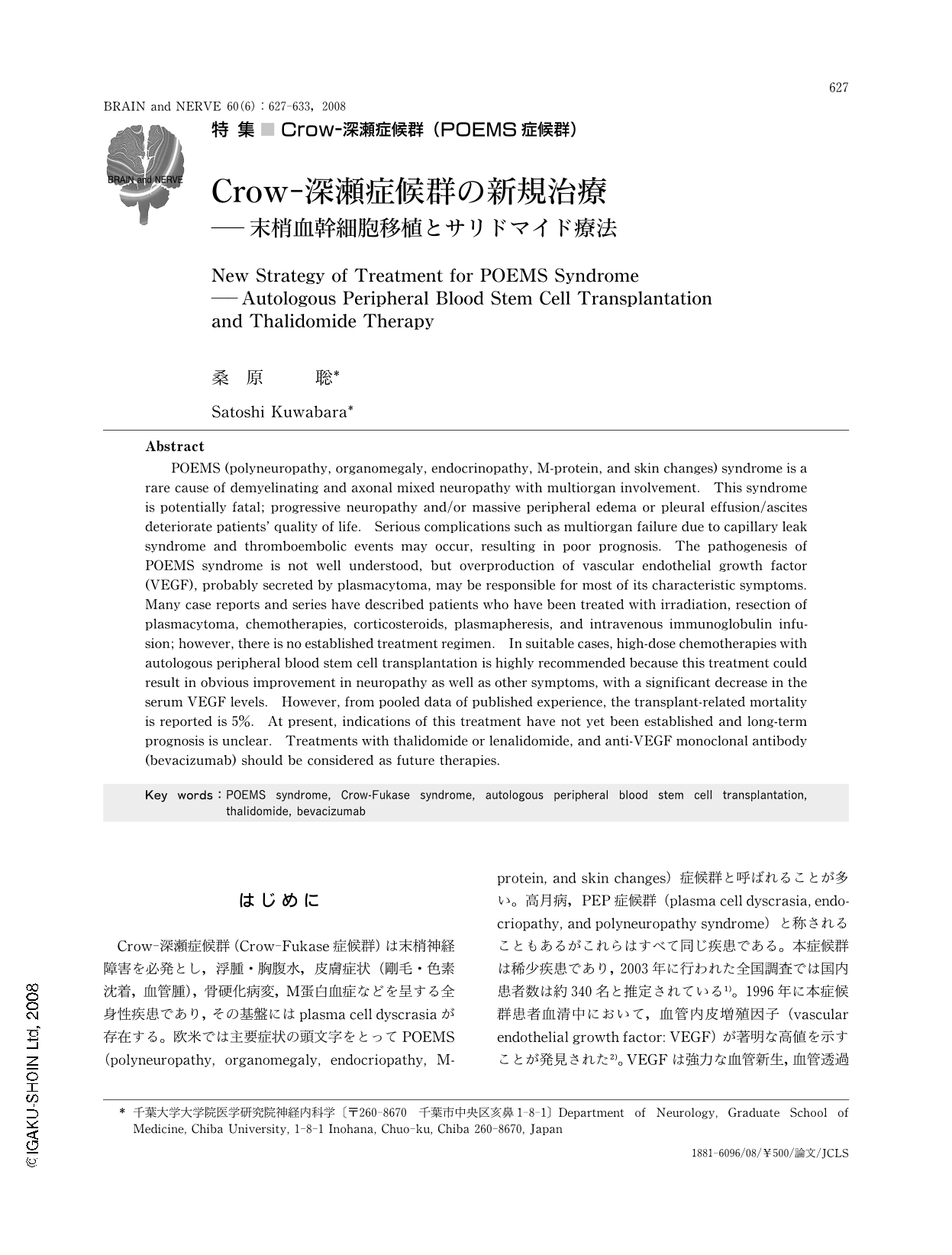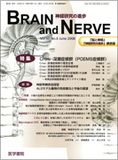Japanese
English
- 有料閲覧
- Abstract 文献概要
- 1ページ目 Look Inside
- 参考文献 Reference
はじめに
Crow-深瀬症候群(Crow-Fukase症候群)は末梢神経障害を必発とし,浮腫・胸腹水,皮膚症状(剛毛・色素沈着,血管腫),骨硬化病変,M蛋白血症などを呈する全身性疾患であり,その基盤にはplasma cell dyscrasiaが存在する。欧米では主要症状の頭文字をとってPOEMS(polyneuropathy, organomegaly, endocriopathy, M-protein, and skin changes)症候群と呼ばれることが多い。高月病,PEP症候群(plasma cell dyscrasia, endocriopathy, and polyneuropathy syndrome)と称されることもあるがこれらはすべて同じ疾患である。本症候群は稀少疾患であり,2003年に行われた全国調査では国内患者数は約340名と推定されている1)。1996年に本症候群患者血清中において,血管内皮増殖因子(vascular endothelial growth factor: VEGF)が著明な高値を示すことが発見された2)。VEGFは強力な血管新生,血管透過性亢進などの生理的作用を持つことから本症候群の浮腫,臓器腫大,血管腫などの臨床症状を説明しやすく,病態と深く関連すると考えられており3-5),現在VEGFを含めた診断基準が提唱されている(Table1)6,7)。VEGFはおそらく,形質細胞により産生されると考えられるため,本症候群の治療の本質は形質細胞腫あるいはplasma cell dyscrasiaに対する治療となる。
1980年代には副腎皮質ステロイドを中心に治療が行われており,平均生存期間33カ月と生命予後は非常に不良であることが報告されていた8)。1990年代には長期MP療法が導入され,生存期間は5~10年に延長したが9),残念ながら長期的な寛解や治癒に至った症例の報告はいまだに皆無である。多発性骨髄腫の標準的治療が古典的なMP(メルファラン,プレドニゾロン)療法,VAD(ビンクリスチン,アドリアマイシン,デキサメサゾン)療法などから,自己末梢血幹細胞移植(Auto-PBSCT)を伴う大量化学療法,サリドマイド,プロテアソ-ム阻害薬に移行しつつあることを受けて,本症候群に対する治療も変遷している。特に2000年代に入って盛んに行われ始めたAuto-PBSCTを伴う大量化学療法は,長期寛解を目指す新規治療法として,本症候群の第一選択となりつつある。しかし移植療法は高齢者や多臓器病変(特に腎障害)を有する患者には施行できず,移植の適応にならない場合の新規治療法としてサリドマイド療法が期待されている。本稿ではAuto-PBSCTを伴う大量化学療法,サリドマイド療法,抗VEGFモノクローナル抗体による新規治療の現状を紹介する。本症候群患者では,末梢神経障害の進展のために日常生活動作が大きく制限されることも多く,さらに生命予後が不良であることも含めて,本症候群の治療ガイドラインを確立することは急務である10)。
Abstract
POEMS (polyneuropathy, organomegaly, endocrinopathy, M-protein, and skin changes) syndrome is a rare cause of demyelinating and axonal mixed neuropathy with multiorgan involvement. This syndrome is potentially fatal; progressive neuropathy and/or massive peripheral edema or pleural effusion/ascites deteriorate patients' quality of life. Serious complications such as multiorgan failure due to capillary leak syndrome and thromboembolic events may occur, resulting in poor prognosis. The pathogenesis of POEMS syndrome is not well understood, but overproduction of vascular endothelial growth factor (VEGF), probably secreted by plasmacytoma, may be responsible for most of its characteristic symptoms. Many case reports and series have described patients who have been treated with irradiation, resection of plasmacytoma, chemotherapies, corticosteroids, plasmapheresis, and intravenous immunoglobulin infusion; however, there is no established treatment regimen. In suitable cases, high-dose chemotherapies with autologous peripheral blood stem cell transplantation is highly recommended because this treatment could result in obvious improvement in neuropathy as well as other symptoms, with a significant decrease in the serum VEGF levels. However, from pooled data of published experience, the transplant-related mortality is reported is 5%. At present, indications of this treatment have not yet been established and long-term prognosis is unclear. Treatments with thalidomide or lenalidomide, and anti-VEGF monoclonal antibody (bevacizumab) should be considered as future therapies.

Copyright © 2008, Igaku-Shoin Ltd. All rights reserved.


